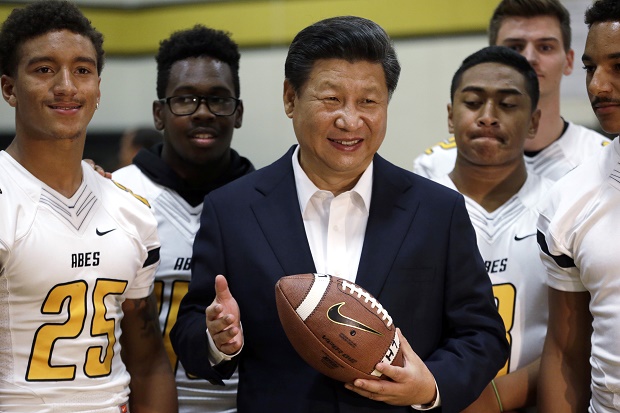
Chinese President Xi Jinping poses with football players and a football he was given during a visit to Lincoln High School, Wednesday, Sept. 23, 2015, in Tacoma, Wash. Xi is on the second of a three-day trip to Seattle before traveling to Washington, DC, for a White House state dinner on Friday. AP
SEATTLE, United States—Chinese President Xi Jinping heads to Washington Thursday for summit talks with Barack Obama having made clear that few compromises are in store on hot-button issues like cyber theft and the South China Sea.
READ: US-China summit takes place amid human rights crackdown
Xi spent two days in Seattle driving home the message that good economic and commercial relations are at the core of the bilateral relationship, and that the Obama administration should respect China’s different views on political questions.
In his only major speech planned for the trip, Xi said Tuesday that the two need to better understand each other’s “strategic intentions” and called for a “new model of major country relationship,” one with more understanding and less suspicion.
READ: China warns US: Avoid conflict or face disaster
“Should they enter into conflict and confrontation, it would lead to disaster for both countries and the world at large,” he warned.
But those were only a handful of lines in a speech and two days of talks centered around the importance of China to major US companies and a number of state economies like California.
On Wednesday 15 chief executives from the largest US companies—Apple, Boeing, General Motors, Amazon and Microsoft among them—met in roundtable talks with Xi during which his message was that they could count on him to keep China’s economy strong, to expand opportunities and to make sure they are treated fairly in their China business.
And, putting an exclamation point on the end of that, he then traveled to Boeing’s main plant near Seattle where it was announced that China was ordering 300 new aircraft from the US company worth some $38 billion.
“China will open up still wider to the outside world: without reform there will be no driving force, without opening up there will be no progress,” he told the CEOs at the roundtable.
Cyber theft and human rights
His speech—which included generous, appreciative references to US culture including mentions of Ernest Hemingway, Martin Luther King and the popular political drama “House of Cards”—took pains to show Xi as a non-threatening leader whose focus is lifting the livelihoods of his people.
But the focus in Seattle on cozy business relations is likely to give way to contentious talks with Obama in Washington over issues like China’s expanding presence in the South China Sea, cyber theft and human rights.
Analysts said that, when well-parsed, Xi’s speech showed little sign of compromise and more determination to claim an equal superpower role on the world stage with the United States.
The Chinese leader “admitted no fault in any of his own policy positions or actions and placed all of the burden on improving the chilly relationship on the United States,” said Scott Kennedy, a China specialist at the Center for Strategic and International Studies in Washington.
“The core of the speech was a vigorous defense of every aspect of his governance and the many areas where the United States and China are at loggerheads.”
Agree to disagree?
Xi starts in Washington with a private dinner Thursday night with Obama at the White House, a formal arrival ceremony early Friday and then a day of talks before a state dinner that evening.
With both sides under domestic pressures to demonstrate toughness, nothing too concrete is expected out of the summit. Analysts say the two could reach a mutual “no first-use” pact on cyber attacks on critical infrastructure, evoking Cold War no first-use agreements on nuclear weapons.
On other issues, however, they could just agree to disagree. Xi has already brushed off US concerns of its expansion in the South China Sea.
On alleged Chinese industrial espionage and commercial cyber-theft, Xi acknowledged the issue and called it a “crime” that affects both sides.
Washington has threatened punitive sanctions against senior Chinese officials, implying government tolerance if not support for the hackers.
But Xi simply proposed a new “high level” committee on the problem and said it was a matter for law enforcement, suggesting he sees the sanctions threat as unjustified.
In another issue the White House has spotlighted, a new Chinese security law that threatens foreign non-governmental organizations operating in the country, Xi assured that NGOs had a role “so long as their activities are beneficial to the Chinese people.”
But he added that the foreign NGOs in China “need to obey Chinese law and carry out activities in accordance with the law.”
For China’s part, Xi called for the United States to loosen controls on the export to China or Chinese companies of a range of “sensitive” civilian technologies.
And he made reference to China’s request for the United States to expel or extradite Chinese fugitives charged with corruption, who Beijing says are hiding in the United States.